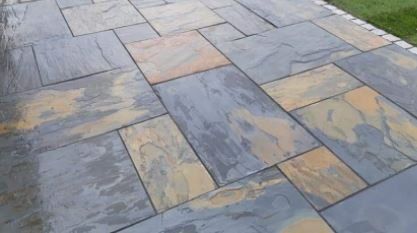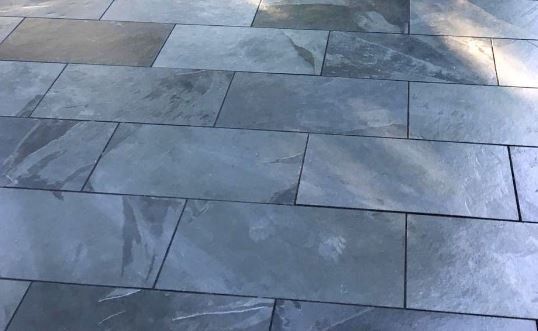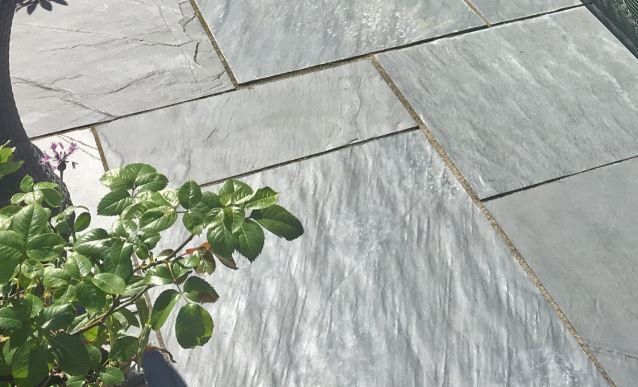Slate Paving Leeds
Slate Paving
Slate Paving is another naturally formed stone, which can be cut to provide a hard-wearing paving ideal for paths and patios, as well as for roofing in the form of roof tiles.
Similar to some of the other natural stones it is a metamorphic rock meaning that it has been formed over many, many years through the application of heat and pressure. The basic ingredients for slate are shale which itself is muddy clay, with sand and volcanic dust - other additional minerals provide additional variations in colour and density. The pressure and heat transforms this into slate but it has a subtle layering, sometimes referred to as strata within in. Slate mines can still be found in the UK in North Wales, Cumbria and Cornwall.
Slate Paving options
From a naturally occurring perspective slate can be formed in the following colours: grey, green, red, blue, brown, purple and black. As mentioned the colour will be based on the inclusion of other minerals and compounds. The presence of iron oxide will push the colour towards red and purple shades whilst chlorite will impart a green shade.
However from a paving stone perspective the most common shades will be
variations
of grey with hints of green, blue or purple, copper through to charcoal and black. As with most other pavers they will be available in a number of sizes to enable you to have an interesting paving area rather than just fitting one
size of paving slabs right across your patio.
Looking after a Slate Paving Patio
Due to the way slate is formed it is a little more prone to some initial lamination during the initial install. The transportation and formation of the slabs will cause some layering to loosen. However, once these initial loose layers have been removed you should be left with a hardwearing paving stone. The lamination itself does provide some additional character to the paving but you may want to use some alternative for the boarder of the patio area as the edges of slate paving can be sharper than most of the other paving slabs options.
As with all outdoor paving stones - specialist 'slate paving cleaning fluids' will be available to buy and naturally you would expect them to be specially formulated to clean well whilst protecting your natural paving. If you have got a particular stain or issue then it would be worth checking out these specialist cleaners and if you know what your particular spill or stain is then picking one which specifically mentions that it is effective for cleaning this type of dirt. If the accumulation of dirt is simply the usual out door rain, leaves and the associated dirt and droppings which you will get outdoors you should be fine to brush away and if necessary gently power wash with some mild detergent.
Need help?
Looking to install a Slate Paving Patio in Leeds?
Frequently Asked Paving Questions
-
Can you paint patio slabs?
The brief reply to the question is yes. However, if you are thinking of repainting your outdoor patio rather than replacing it you truly ought to not try to do this on a tight budget - which may seem counterintuitive but it will be counterproductive.
Top-quality acrylic based paints would certainly be best. However, you must understand that to provide resilience these paints will certainly require to be applied heavily and also in numerous coats with a brush or roller. Also, they should be allowed to completely dry normally for a couple of days, so please inspect the forecast prior to starting this course of action. These paints are often designed for warehouses for marking safety routes so the colour options may also be a little unnatural for a garden environment.
With a painted patio - remember this is just a layer and will undergo table and chair bumps and scrapes. It may give a band-aid approach to boosting the look of your patio for a little while but once the paint starts to chip away attempting to overpaint once more will certainly not look great!
-
Can you lay patio slabs straight onto grass?
Of course, you can simply lay a paving piece on any surface area however you need to think about what will be completed effect. If you just intended to use a few slabs simply as a stepping rock then with a little sand and a little work with a spade you could level the ground to place a paver that can be stepped on without wobbling for a while. However, if you are intending on utilising chairs, tables, bar-b-ques you really should set your paving slabs into an effectively-prepared sub-base, which will certainly provide a strong, flat base for your pavers to then be fixed onto a mortar base. This will prevent weeds from showing up via paving joints and also ensure you do not have loose or unsteady paving stones.
-
Which is better for a patio area - decking or paving?
Clearly, an installer who only does one of these will persuade you down that particular path. However, there are some scenarios where one may have the edge over the other. One of the main ones being the budget you are working with.
As a quick comparison - especially against wooden decking a patio made up from any of the slab options we have covered will be stronger, and as a result, last longer and require less maintenance. However, if you want to have a large single level social area and have a garden on a steep slope decking will offer a more cost-effective solution. The decking can be laid on a frame, which can simply be build up from the lower end of the slope. To do the same for a paved patio will require much more death moval and supporting walls to be constructed so will be more costly.
-
Can the same paving slabs be used for a driveway?
Yes - certain types of paving can also be used for a driveway so you can have consistent paving from the front of your house down the sides and to your back garden patio.
Not all pavers will be suitable but granite setts and driveway grade Indian stone would be perfectly good choices for this.
-
What's the best way to clean a patio
Clearly, this will depend on how dirty your patio is and whether or not staining has taken place.
For regular quick and easy cleaning simply mixing a cup of washing up liquid in a bucket of warm water and brushing this across your patio with a firm bristled brush is suitable for all types of pavers.
Pressure washing can be used for most pavers but this can remove sealers - although thoroughly cleaning this way will be good preparation for re-sealing when dry. with a pressure washer you should be more careful near the joints as high pressure can damage and dislodge jointing. If this does happen it is best to apply some jointing compound to prevent this from becoming an area for weed and algae growth. There are many options on the market, many of which can simply be brushed into the gaps so no DIY skills requried.
Business Hours
- Mon - Sun
- -
All Rights Reserved | Paving Leeds - Leeds paving contractors



